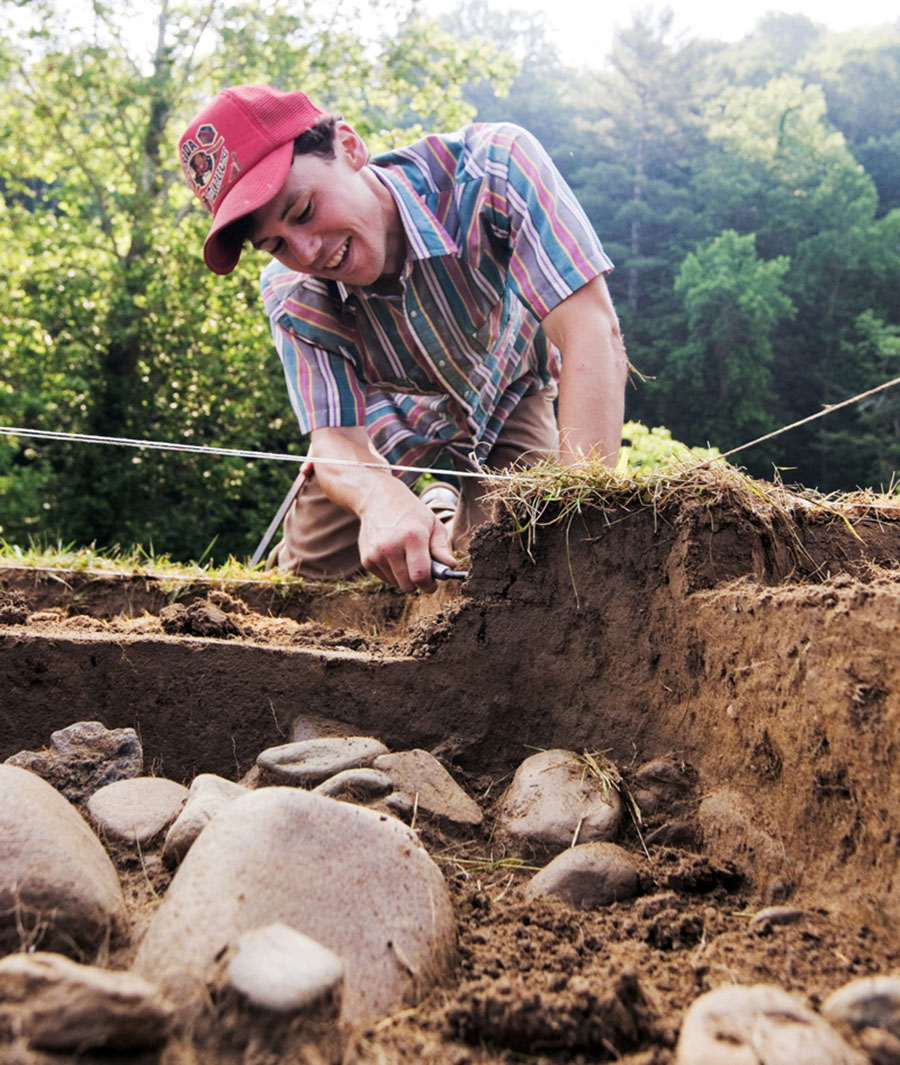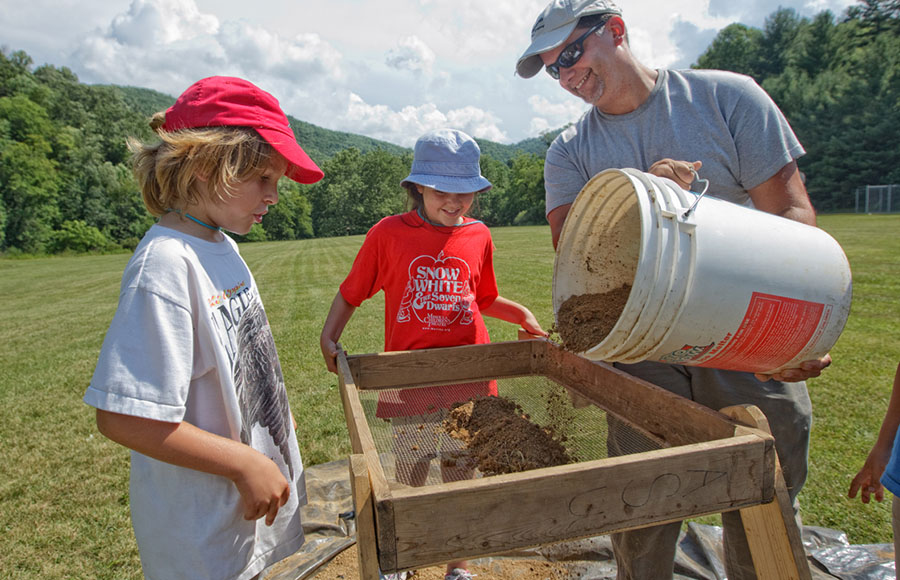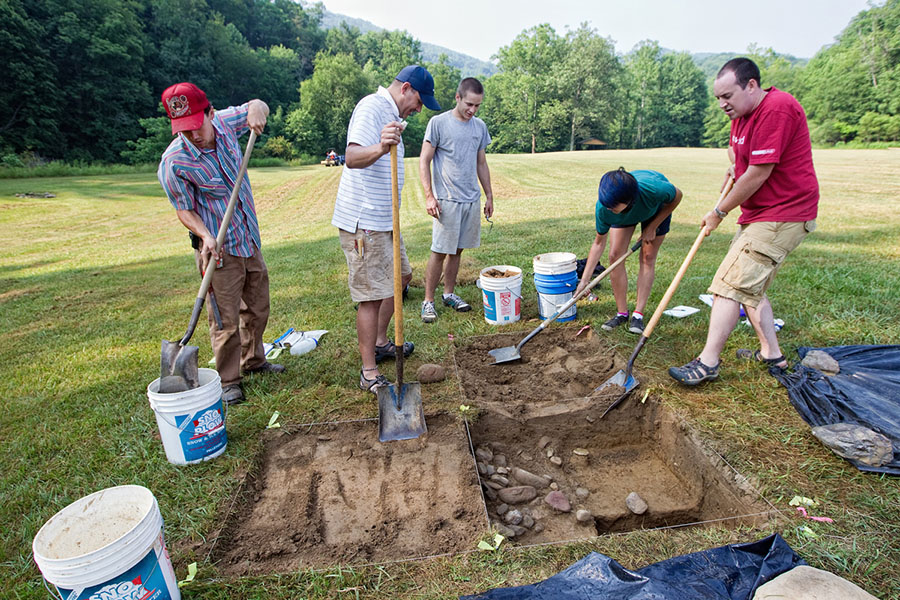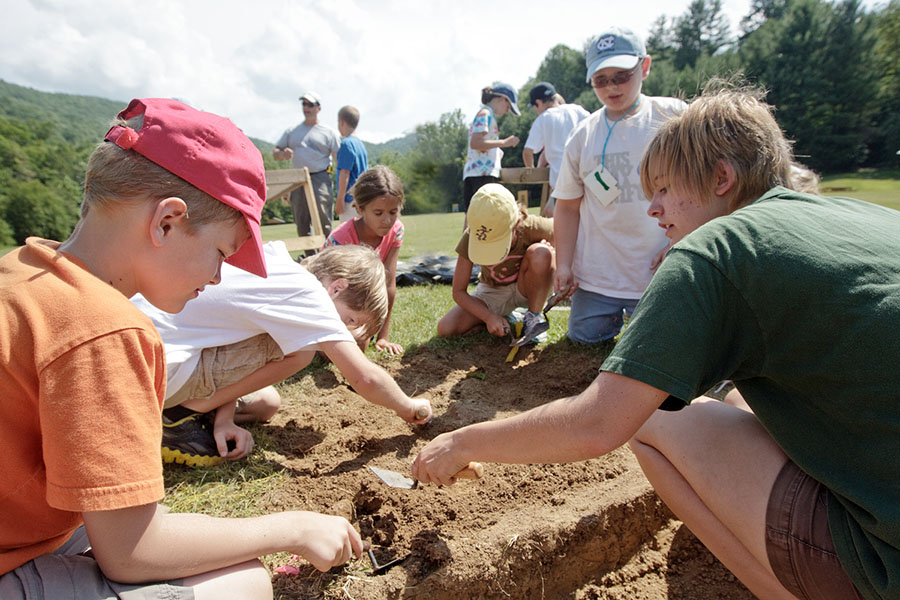BOONE, N.C. — Children who play on an athletics field at Appalachian State University’s Camp Broadstone in Valle Crucis may not realize the history that lies beneath their feet. This summer, university students in Appalachian’s archeology field school found a 4,000-year-old cooking hearth and a small vessel nearly as old about two feet underground.
Area children at a day camp got their chance to explore the archeological site, too, during educational programming for third through sixth graders at Camp Broadstone, the university’s 55-acre outdoor adventure and retreat center. “Do you know what archeology is?” asked Appalachian junior Katrina Kremer, who helped lead a group of about a dozen academically gifted children through the basics of archeology.
“Fossils?” asked one child. “Ancient stuff?” asked another. “You’re kind of right. It’s the study of past humans, what they did and the materials they used,” said Kremer. “When we’re in the field, we look for what may be artifacts and then we can go look at them in the lab.”

Anthropology major Clifton Hicks carefully scrapes soil around what is believed to be the remnants of a stone cooking hearth from about 4,000 years ago. The feature was found during an archeology field school held on Appalachian State University property at Camp Broadstone in Valle Crucis. Samples were taken for further study in a campus lab this fall.
Like their college-age counterparts, the children carefully scraped soil from a 2-by-2-foot grid and sifted it through screens to find any evidence of early humans. About an hour into their work, they found a flake of quartz from the making of a tool and two rocks that appeared to have been burned – all worth noting in the outing’s archeology journal.
“Do you know what is the most important item in an archeologist’s tool bag?” Derek Johnson, another Appalachian student leader, asked the children. “A pencil, so you can write down what you found and where you found it.”
Encouraging students’ curiosity about science as well as technology and math, known as the STEM disciplines, is an important outreach for Appalachian. “Appalachian is committed to getting students interested in the variety of sciences that exist. If we don’t get in there early enough, children may not develop that interest,” said Dr. Anthony Calamai, dean of the College of Arts and Sciences which houses the Department of Anthropology and 14 other disciplines.
Anthropology professor Dr. Tom Whyte, who led Appalachian students in their summer archeology field school, said the artifacts found at Camp Broadstone this year are “just a sprinkling of what had been here before.” In 1977, the camp property between Broadstone Road and the banks of the Watauga River revealed a number of credible artifacts that showed human activity about 1,200 years ago, including arrow points and pottery.
The Camp Broadstone property, Whyte explained, has seen a number of “disturbances” over time – such as floods, farm plowing that started in the 1700s and heavy-machinery construction as late as the 1960s that built the camp’s existing athletics field. Each time the ground was moved, stones and artifacts that depicted daily life of the early inhabitants were disrupted and scattered from their original location.
This summer, Whyte’s students found stones with old plow marks in the upper layers of the soil. Digging deeper, they found a cluster of reddish-colored rocks, characteristic of fire and most likely the site of an ancient cooking hearth. Further testing in Appalachian’s lab this fall in the students’ follow-up course will reveal details of the rocks.
Because the purpose of the field school was to learn how to interpret soil and study land forms in a variety of settings, the Appalachian students also visited a rock shelter further downriver in Valle Crucis and a cave on Mount Jefferson in Ashe County. In each setting they learned excavation techniques and how to map, measure and record any evidence they found.
The opportunity to learn the basic techniques of archeology “is a big deal for me,” said rising senior Clifton Hicks, an anthropology major. “Since I was a kid I’ve been fascinated with prehistoric garbage – anything that’s old.” His most memorable part of this summer’s field school was finding a 5,000-year-old knife blade and an arrow point from around the 1300s in the rock outcropping where for thousands of years people have sought shelter. “That was super cool stuff,” he said. He looks forward to using his archeology skills working for a cultural resource management crew hired by corporations or government entities to study land to be impacted by road construction or other development.
Kremer’s work with the academically gifted children this summer gave her experience toward her career goal to teach anthropology and archeology to young children. “I never knew what anthropology was until college when I had to take a required general education class with Dr. Whyte, and I kind of feel cheated by that,” said Kremer. Originally intending to major in theatre, she loved the course so much she changed her major to anthropology.
“Ideally, it would be cool to teach anthropology and archeology in high school. That’s not really accepted now in public schools but there are some private schools that teach it now. I’d like to work with younger kids,” she said.
Appalachian’s Department of Anthropology offers a B.A. and B.S. degree in anthropology with B.A. concentrations in applied anthropology and archaeology and B.S. concentrations in sustainable development and biological anthropology. The department has 15 full and part-time faculty members covering the subfields of cultural anthropology, archaeology, biological anthropology, and linguistic anthropology. The faculty members are especially strong in theoretical anthropology, gender studies, Appalachian studies, applied anthropology, sustainable development and field archaeology.
Camp Broadstone is Appalachian State University’s year-round outdoor adventure and retreat center with a specialized summer camp for academically gifted youth in grades third through nine. Broadstone’s summer program includes multiple day camp sessions as well as one-week and two-week residential sessions. Its 55 acres of woods and meadows are located in the small community of Valle Crucis outside Boone.
What do you think?
Share your feedback on this story.
About the Department of Anthropology
The Department of Anthropology offers a comparative and holistic approach to the study of the human experience. The anthropological perspective provides a broad understanding of the origins as well as the meaning of physical and cultural diversity in the world — past, present and future. Learn more at https://anthro.appstate.edu.
About the College of Arts and Sciences
The College of Arts and Sciences (CAS) at Appalachian State University is home to 17 academic departments, two centers and one residential college. These units span the humanities and the social, mathematical and natural sciences. CAS aims to develop a distinctive identity built upon our university's strengths, traditions and locations. The college’s values lie not only in service to the university and local community, but through inspiring, training, educating and sustaining the development of its students as global citizens. More than 6,800 student majors are enrolled in the college. As the college is also largely responsible for implementing App State’s general education curriculum, it is heavily involved in the education of all students at the university, including those pursuing majors in other colleges. Learn more at https://cas.appstate.edu.
About Appalachian State University
As a premier public institution, Appalachian State University prepares students to lead purposeful lives. App State is one of 17 campuses in the University of North Carolina System, with a national reputation for innovative teaching and opening access to a high-quality, cost-effective education. The university enrolls more than 21,000 students, has a low student-to-faculty ratio and offers more than 150 undergraduate and 80 graduate majors at its Boone and Hickory campuses and through App State Online. Learn more at https://www.appstate.edu.







![How NCInnovation Is Rethinking Economic Development in North Carolina [faculty featured]](/_images/_posts/2026/02/rethinking-economic-development-600x400.jpg)






